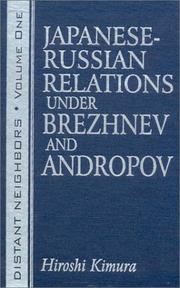| Listing 1 - 10 of 17 | << page >> |
Sort by
|
Book
ISBN: 080143260X 9780801432606 Year: 1996 Volume: *14 Publisher: Ithaca, N. Y. ; London Cornell University Press
Abstract | Keywords | Export | Availability | Bookmark
 Loading...
Loading...Choose an application
- Reference Manager
- EndNote
- RefWorks (Direct export to RefWorks)
National security --- Internal security --- Japan --- National security - Japan. --- Internal security - Japan. --- National security - Japan --- Internal security - Japan
Book
ISBN: 0080409881 9780080409887 Year: 1991 Volume: 5 Publisher: London: Brassey's,
Abstract | Keywords | Export | Availability | Bookmark
 Loading...
Loading...Choose an application
- Reference Manager
- EndNote
- RefWorks (Direct export to RefWorks)
Book
ISBN: 2894890370 9782894890370 Year: 1997 Publisher: Paris : L'Harmattan,
Abstract | Keywords | Export | Availability | Bookmark
 Loading...
Loading...Choose an application
- Reference Manager
- EndNote
- RefWorks (Direct export to RefWorks)
Superpuissance financière, commerciale et technologique, le Japon aura longtemps fait mentir l'Histoire en se maintenant à l'écart des grands enjeux politiques et stratégiques mondiaux. Hanté par un passé militariste et colonial, le Japon d'aujourd'hui reste encore étroitement surveillé par ses voisins d'Asie. Tributaire des Etats-Unis pour sa défense depuis l'après-guerre, le Japon fait aujourd'hui face aux incertitudes de l'univers post-soviétique. Sur quelles bases a-t-il redéfini sa politique de sécurité militaire, et dans quel contexte évoluera-t-il avec son allié américain dans un système international que l'on veut désormais sans adversaire, alors qu'il demeure plongé dans un cadre régional en pleine mutation où le passé résiste à l'oubli ?
National security --- Japan --- Military policy --- Defenses --- History, Military --- Foreign relations --- National security - Japan --- Japan - Military policy --- Japan - Defenses --- Japan - History, Military - 1868 --- -Japan - Foreign relations

ISBN: 080145798X 0801459222 9780801459221 9780801446122 0801446120 9780801457982 0801474906 9780801474903 Year: 2010 Publisher: Ithaca, NY
Abstract | Keywords | Export | Availability | Bookmark
 Loading...
Loading...Choose an application
- Reference Manager
- EndNote
- RefWorks (Direct export to RefWorks)
For the past sixty years, the U.S. government has assumed that Japan's security policies would reinforce American interests in Asia. The political and military profile of Asia is changing rapidly, however. Korea's nuclear program, China's rise, and the relative decline of U.S. power have commanded strategic review in Tokyo just as these matters have in Washington. What is the next step for Japan's security policy? Will confluence with U.S. interests-and the alliance-survive intact? Will the policy be transformed? Or will Japan become more autonomous? Richard J. Samuels demonstrates that over the last decade, a revisionist group of Japanese policymakers has consolidated power. The Koizumi government of the early 2000's took bold steps to position Japan's military to play a global security role. It left its successor, the Abe government, to further define and legitimate Japan's new grand strategy, a project well under way-and vigorously contested both at home and in the region. Securing Japan begins by tracing the history of Japan's grand strategy-from the Meiji rulers, who recognized the intimate connection between economic success and military advance, to the Konoye consensus that led to Japan's defeat in World War II and the postwar compact with the United States. Samuels shows how the ideological connections across these wars and agreements help explain today's debate. He then explores Japan's recent strategic choices, arguing that Japan will ultimately strike a balance between national strength and national autonomy, a position that will allow it to exist securely without being either too dependent on the United States or too vulnerable to threats from China. Samuels's insights into Japanese history, society, and politics have been honed over a distinguished career and enriched by interviews with policymakers and original archival research. Securing Japan is a definitive assessment of Japanese security policy and its implications for the future of East Asia.
National security --- Japan --- East Asia --- Military policy. --- Foreign relations --- Foreign relations. --- National security - Japan --- Japan - Military policy --- Japan - Foreign relations - 1945 --- -East Asia - Foreign relations
Book
ISBN: 9780415556927 0415556929 Year: 2009 Volume: 403 Publisher: Abingdon : London : Routledge ; International Institute for Strategic Studies,
Abstract | Keywords | Export | Availability | Bookmark
 Loading...
Loading...Choose an application
- Reference Manager
- EndNote
- RefWorks (Direct export to RefWorks)
Is Japan on a path towards assuming a greater military role internationally, or has the recent military normalisation ground to a halt since the premiership of Junichiro Koizumi? In this book, Christopher W. Hughes assesses developments in defence expenditure, civil-military relations, domestic and international military-industrial complexes, Japan's procurement of regional and global power-projection capabilities, the expansion of US-Japan cooperation, and attitudes towards nuclear weapons, constitutional revision and the use of military force. In all of these areas, dynamic and long-term changes outweigh Japan's short-term political logjam over security policy. Hughes argues that many post-war constraints on Japan's military role are still eroding, and that Tokyo is moving towards a more assertive military role and strengthened US-Japan cooperation. Japan's remilitarisation will boost its international security role and the dominance of the US-Japan alliance in regional and global security affairs, but will need to be carefully managed if it is not to become a source of destabilising tensions
#SBIB:328H53 --- #SBIB:327.5H11 --- Instellingen en beleid: Japan --- Collectieve veiligheid --- Remilitarization - Japan --- National security - Japan --- Military readiness - Japan --- Japan - Military policy --- Japan - Armed Forces - Operational readiness --- Japan - Armed Forces --- Japan - Defenses --- Remilitarization --- National security --- Military readiness --- Japan --- Remilitarisation --- Sécurité nationale --- Japon --- Military policy. --- Politique militaire
Book
ISBN: 9781472417138 9781315606521 9781317062752 9781317062769 1472417143 1472417135 1472417151 Year: 2016 Publisher: London Routledge, Taylor & Francis Group
Abstract | Keywords | Export | Availability | Bookmark
 Loading...
Loading...Choose an application
- Reference Manager
- EndNote
- RefWorks (Direct export to RefWorks)
International relations. Foreign policy --- Japan --- J4810.70 --- Japan: International politics and law -- international relations, policy and security -- Kindai (1850s- ), bakumatsu, Meiji, Taishō --- J4812.10 --- Japan: International politics and law -- international relations, policy and security -- Asia -- East Asia --- National security --- International relations --- Foreign relations --- Politics and government --- National security - Japan --- Japan - Foreign relations - 1989 --- -Japan - Politics and government
Book
ISBN: 9781138315808 9780429456114 9780429850769 9780429850752 9780429850745 042985076X 0429850751 113831580X 0429850743 0429456115 Year: 2019 Publisher: London Routledge, Taylor & Francis Group
Abstract | Keywords | Export | Availability | Bookmark
 Loading...
Loading...Choose an application
- Reference Manager
- EndNote
- RefWorks (Direct export to RefWorks)
This book assesses EU-Japan security relations, examining how they have developed in individual security sectors and how they could be affected by international developments. The conclusions of the Economic Partnership Agreement and the Strategic Partnership Agreement in 2017 demonstrate the steady growth in EU-Japan political relations. Since the 1990s, dialogues between the EU and Japan have benefitted from extensive trade and investment ties and shared liberal values. Based on collaborative research by European and Japanese scholars, this book provides an in-depth, systematic and comparative analysis of the extent to which the EU and Japan have achieved concrete actions in the pursuance of security cooperation across a range of key areas such as nuclear proliferation, regional security, international terrorism, and energy and climate security. Further, it seeks to explain why some security sectors (such as economic and cybersecurity) have resulted in more extensive EU-Japan cooperation, while others lag behind (such as military and regional security). Common declarations and actions of shared interest and concerns have often led to only modest levels of security collaboration, and the book highlights factors that may be seen as intervening between intention and action, such as the role of external actors, for instance China and the US, and the constraints of internal EU and domestic Japanese politics. This book will be of much interest to students of European security, Japanese politics, diplomacy studies and international relations
Polemology --- European Union --- Japan --- National security --- European Union countries --- Relations --- Military relations --- National security - European Union countries --- National security - Japan --- European Union countries - Relations - Japan --- Japan - Relations - European Union countries --- European Union countries - Military relations - Japan --- Japan - Military relations - European Union countries

ISBN: 0415305071 0415405939 9786610149087 1280149086 0203986547 1134406665 9780415305075 Year: 2003 Publisher: London ; New York : RoutledgeCurzon,
Abstract | Keywords | Export | Availability | Bookmark
 Loading...
Loading...Choose an application
- Reference Manager
- EndNote
- RefWorks (Direct export to RefWorks)
Japan's Security Relations with China since 1989 raises the crucial question of whether Japan's political leadership which is still preoccupied with finding a new political constellation and with overcoming a deep economic crisis is able to handle such a complex policy in the face of an increasingly assertive China and a US alliance partner with strong swings between engaging and containing China's power. This study of the highly topical bilateral relationship will be of great interest to students and researchers in Japanese and Chinese Studies, Politics, International Relations and
National security --- Japan --- China --- East Asia --- United States --- Relations --- National security - Japan --- National security - China --- Japan - Relations - China --- China - Relations - Japan --- East Asia - Relations - United States --- United States - Relations - East Asia --- japanese --- chinese --- american --- relationship --- japans --- policy --- chinas --- policies --- engagement --- comprehensive

ISBN: 0765605856 9780765605856 Year: 2000 Volume: 1 Publisher: Armonk (N.Y.): Sharpe,
Abstract | Keywords | Export | Availability | Bookmark
 Loading...
Loading...Choose an application
- Reference Manager
- EndNote
- RefWorks (Direct export to RefWorks)
National security --- Andropov, I͡Uriĭ Vladimirovich, --- Brezhnev, Leonid Ilʹich, --- Soviet Union --- Japan --- Foreign relations --- National securityAndropov, I͡Uriĭ Vladimirovich, --- Brezhnev, Leonid Ilʹich,Soviet Union --- JapanForeign relations --- National security - Soviet Union --- National security - Japan --- Andropov, I͡Uriĭ Vladimirovich, - 1914-1984 --- Brezhnev, Leonid Ilʹich, - 1906-1982 --- Soviet Union - Foreign relations - Japan --- Japan - Foreign relations - Soviet Union --- Soviet Union - Foreign relations - 1945-1991 --- Japan - Foreign relations - 1945-1989
Multi
ISSN: 16609131 16609131 16609131 ISBN: 9783034313803 3034313802 3035106487 Year: 2013 Volume: 21 21 21 Publisher: Bern Peter Lang
Abstract | Keywords | Export | Availability | Bookmark
 Loading...
Loading...Choose an application
- Reference Manager
- EndNote
- RefWorks (Direct export to RefWorks)
Pacifism --- Peace-building --- National security --- Japan --- Foreign relations --- Foreign relations. --- Building peace --- Peacebuilding --- Conflict management --- Peace --- Peacekeeping forces --- Sociology, Military --- Evil, Non-resistance to --- Nonviolence --- J4810.90 --- J4880.90 --- Japan: International politics and law -- international relations, policy and security -- postwar Shōwa (1945- ), Heisei period (1989- ), contemporary --- Japan: Defense and military -- history -- postwar Shōwa (1945- ), Heisei period (1989- ), contemporary --- Pacifism - Japan --- Peace-building - Japan --- National security - Japan --- Japan - Foreign relations
| Listing 1 - 10 of 17 | << page >> |
Sort by
|

 Search
Search Feedback
Feedback About UniCat
About UniCat  Help
Help News
News